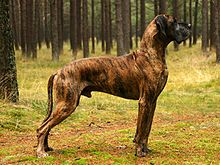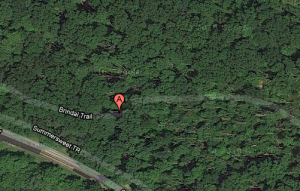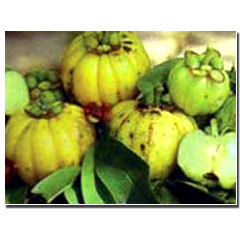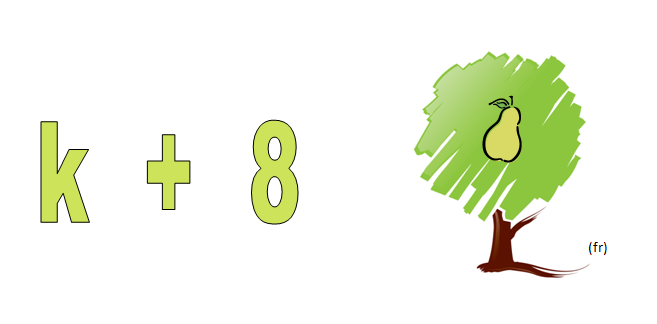JULIET:
‘Tis but thy name that is my enemy;
Thou art thyself, though not a Montague.
What’s Montague? It is nor hand, nor foot,
nor arm, nor face, nor any other part
Belonging to a man. O, be some other name!
What’s in a name? That which we call a rose
by any other name would smell as sweet;
So Romeo would, were he not Romeo call’d,
Retain that dear perfection which he owes
without that title. Romeo, doff thy name,
And for that name which is no part of thee
Take all myself.
Romeo and Juliet (II, ii, 1-2)
For Juliet, a name means nothing save for what is keeping her from her love. Yet despite the fact that a name is nor hand, nor foot, nor any other part belonging to a man, it is in fact the one thing that follows someone, from birth to death, without changing over time.
Would that which I call a Kate by any other name be as…Kate? This I cannot know! My name is my name. It has always been there, it has always been associated with who I am—and so it is important to me. So to answer Juliet’s question, what’s in a name? There is a lot of memory and history in my name.
| Keen
Adventurous Terrific Eager
|
Eclectic
|
Belligerent
Rambunctious Imaginative Noisy Dynamic Animated Lefty |
Perfectionist
Open minded Inquisitive Reactive Indecisive Enthusiastic Real
|
Kate.
Not Katherine, nor Katrina, Kathy, Kaitlin, Katherina, or any other variation of any other name. It is Kate, Short and to the point. It has become second nature, when introducing myself, to provide this information. I am unsure of what compels people to ask me what my name is short for whenever they hear it, but it happens with each new introduction, with each new handshake and with each new face, I expect the “Is that short for…?” and the “Just Kate?”. Apparently Kate is simply not enough for anyone but me!
When I look up the name, low and behold, Kate is not enough:
“Diminutive of KATHERINE. It has been used in England since the Middle Ages. This was the name of the woman who Petruchio marries and tries to tame in Shakespeare’s comedy ‘Taming of the Shrew’ (1593).” (behindthename.com)
That is what is behind my name—I am a diminutive form of Katherine. And while behindthename.com explains that diminutive means pet name, I know that it truly means small, little, tiny, denoting smallness or triviality. Alas, even the very definition of my name belittles it as a consequence of Catherines.
I asked my mother: “why Kate?” Well, simply enough, my parents did not want to name me Katherine! My mother thought that the name Kate was strong but feminine—like the Shrew! I am named after the Shrew. She was argumentative and strong willed, but kind and good hearted. She was intelligent and independent. I like to think that my personality is akin to Shakespeare’s most famous Kate—even though her name was indeed short for Katherina!
When I was two or three years old, my mother learned even more about my name. My sister, Sarah, and I fought all of the time. Our heads were persistently butting, our fists were perpetually clenched, and tumbleweeds of pulled-out-hair blew around the living room. Nary a moment could pass without an argument. My mother then found out that it could not be avoided, that it was history repeating itself! She learned that her great-grandfather and her great-grandmother on her mother’s side had a spinster sister each. Never married, the two ended up living together after meeting at family events. These two were named Sarah—the great-grandmother’s sister, and Kate—the great-grandfather’s sister. The spinster sisters were Irish, in ethnicity and in temperament. They fought constantly, all day, every day. One would wash the dishes under running water; the other would fill the sink. One would make the beds one way, the other would take offense. One would fold laundry in one fashion; the other would disagree with it. If one went one way, the other went the other way. The spinster sisters spent their lives in an enduring Irish argument. When I was two or three years old, my mother thus learned that I would never get along with my sister, and that it was because of our accidental namesakes!
My sister and I also determined another reason, or excuse, for our relationship.
S A R A H = H A R A S = Harass
K A T E = E T A K = Attack
This is what would happen—she would sit next to me, poking and prodding, until my patience ran out and I smacked her. She would harass, I would attack. But we could not be to blame—it was all in the name.
E.
You can’t have an initial as a middle name! What does that stand for??
Alright—is it not enough that I have had to explain that my first name is not short for any other name but itself? My E is an E, nothing more, nothing less. It is an E, standing alone and by itself.
My mother wanted to name me Katie in the beginning. My father disagreed. Katie is not a very professional name. Katie could never hope for a strong business career, or any reputable job. Kate, on the other hand, was a suitable name for future careers. SO my parents chose to give me the best of both worlds. My mother could call me Katie, and my career would not suffer! But she would not be calling me Katie—she would be calling me Kate E.
Brindal
Brindal is not a name. Several naming dictionaries have told me so. Brindal is:
- A descriptive name for a fur colour pattern of some animals, commonly cats, Great Danes, pitbulls and boxers. It can be more rarely seen with horses, cattle and geckos. The patterning involves subtle striping of various colours ranging from dark brown to tan. It seems to be an alternate spelling for the more popular “Brindle”.
- A street in the town of Bicton, in Australia and a mountain biking trail in Ohio. Again, both also exist with the more common Brindle spelling.
- A berry—Brindal berry—Latin name Garcina cambogia, also known as Gambooge and Malabar tamarind. It is grown in Southeast Asia. It has been used in Indian traditional medicine to treat edema, delayed menstruation, constipation and intestinal parasites. It is currently used as an appetite suppressant, in energy products, and in weight-loss supplements. There have been no tests to see if any of this actually works, and the only sources available are questionable at best. The above information comes from Wikipedia.
- Diminutive of Celebrindal, the surname of Idril of Gondolin, a character in Tolkien’s Middle Earth. The name means “silver-foot”, and Idril gained the name because she walked barefoot wherever she went (http://www.glyphweb.com/arda/c/celebrindal.html). This one is fitting—I hate wearing shoes!
This one has even me stumped—so far as I can tell, Brindal is not a name! This unexplainable has been the bane of my series of names that no one quite believes. Still not having gotten over the fact that my diminutive name could stand alone, flabbergasted by my E-nitial, no one believes me by the time I get to my third name. So I don’t try to explain it, because there is no logic behind this one!
My mother still will not apologize. Her defense: she liked the name Brin. She wanted my middle name to be Brin. Every member of her family goes by, or went by, their middle names instead of their first names. My mother really enjoyed the name. And yes! Brin, unlike Brindal, is a name! Brin is a variant of Bryn, which is a masculine name stemming from the Welsh for mound or hill (behindthename.com). Though it may be a masculine name, my mother thought it had a feminine ring to it. She enjoyed the name because no one else at school would be named Brin, and she wanted me to have a unique name should I choose to use it. Considering I was one of three Kate/Katie’s in my elementary years, a unique name would have been nice to fall back on! In fact, doing this project is the first I have heard the name Brin. Before, I had only known Brindal, the bane of my name, the non-existant name, confused with Grundle. The extra syllable was added on because my mother felt that “Kate E. Brin” was too monosyllabic, and it did not have a nice ring to it.
“But why would you add al to it?” I asked. The response came with a shrug, “It sounded right at the time!”
Poirier
Not a chosen name bur a surname, descended through time. My father does not know much about his side of the family. He knows that they have been in Canada for as many generations as he can count, that at least his parents grew up in Montreal, and that the family line originated in France. My father’s parents, my grandparents, moved to Florida when he was 17 years old. Before the age of 17, few people are interested in finding out about their distant family history. So he does not know much about his family line, and so neither do I.
In high school, I was skimming through my French dictionary only to see my name. In seventh grade I learned that I was a pear tree! The word poirier is a directly translated to pear tree.
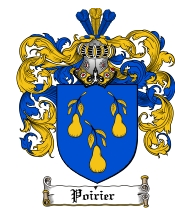 According to the Dictionary of American Family Names, Poirier is of French origin and is the topographic name for someone who lived by a pear tree, from the Old French perier. The name originated in Medieval France in the region of Normandy, when most people were illiterate—thus there are several spelling variations of the name: Poirrier, Poiré, Poirré, Poirrez, Poiriez, among others (http://www.houseofnames.com/poirier-family-crest).
According to the Dictionary of American Family Names, Poirier is of French origin and is the topographic name for someone who lived by a pear tree, from the Old French perier. The name originated in Medieval France in the region of Normandy, when most people were illiterate—thus there are several spelling variations of the name: Poirrier, Poiré, Poirré, Poirrez, Poiriez, among others (http://www.houseofnames.com/poirier-family-crest).
This is one of the variations of family crest that I have found, all of which present golden and blue hues, three pears and a helmet.
It the province of Quebec, it is difficult not to run across other Poiriers! Last I checked, which was a few years ago when the internet was not my only phone book, there were 8 pages of Poiriers in the phone book. One of my good friends had a long-term girlfriend who was a Poirier—we didn’t realize that we had the same last name for a long time, and thought it was great when we found out! My mother, who has taken the Poirier name, is an elementary school librarian. For a few years, the principal of this school was a Mr. Chuck Poirier. Students at the school never could grasp the concept that there could be a Mr. Poirier and a Mrs. Poirier working at the same school who were in no way related to each other. Most students believed that they were married. I go into the school occasionally, and many students know that Mrs. Poirier is my mother (even though I’m Ms. Kate…). They then assume that Mr. Poirier is my father, at which point I have to explain that he is not! It is very confusing situation for them! I tried to get my real name as an email address…but there are so many Poiriers that I couldn’t get any variation of first and last names to work!!
The last name Poirier has served me well. As an Anglophone living in the province of Quebec, having a last name like Poirier has made many employers think that I am much more bilingual than I am. The name opens doors and gets me in to interviews.
I have, however, gained a nickname by embracing my English nature. I have become a peartree, reflected in my email. This nickname was developed in seventh grade, when we were playing with Wordles in class. We all decided to turn our names into Wordles, and mine stuck. I am k8 Peartree!
Of all of my names, my nickname happens to be my favourite. I like to be, the one and only, k8 peartree!


